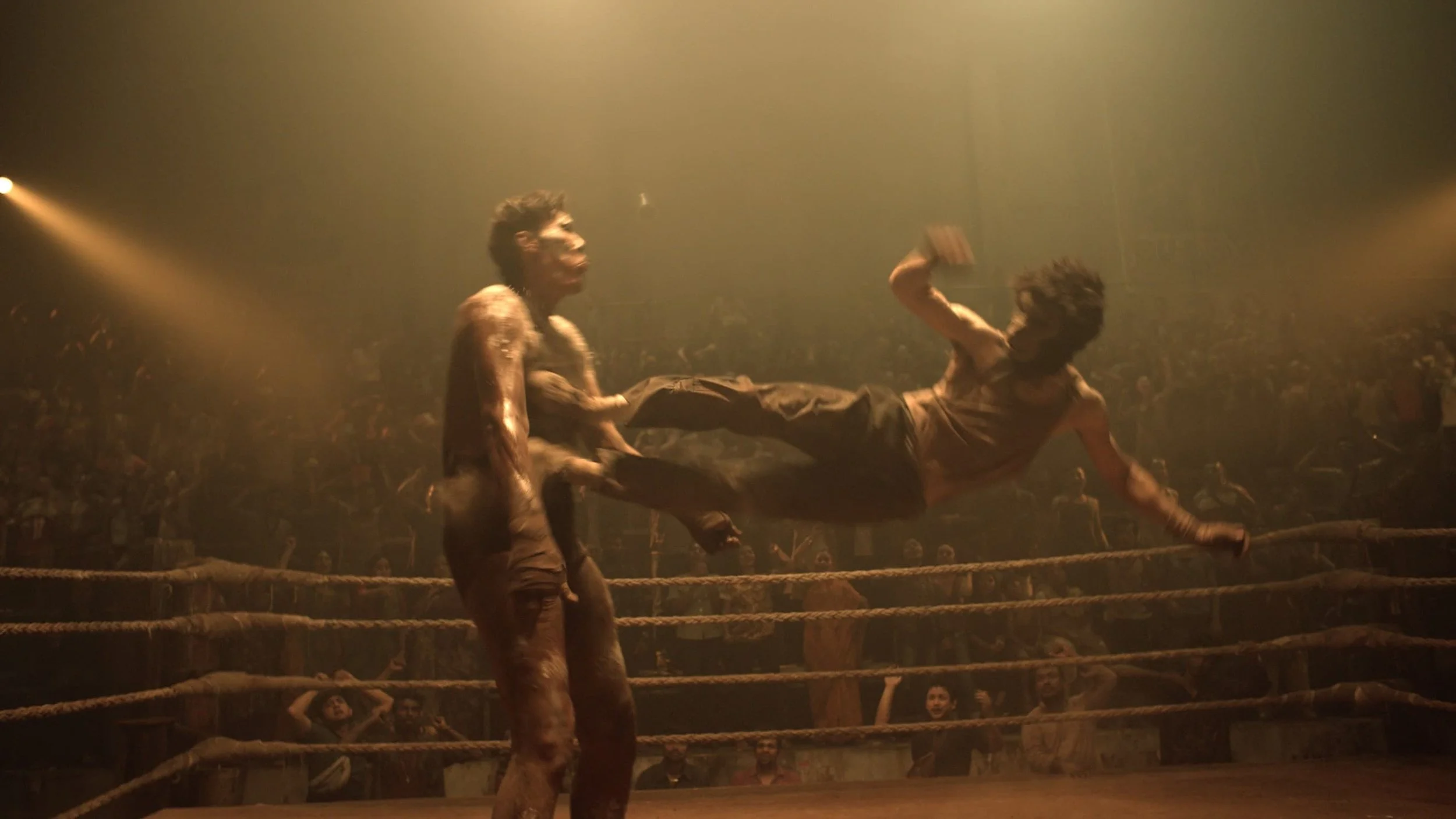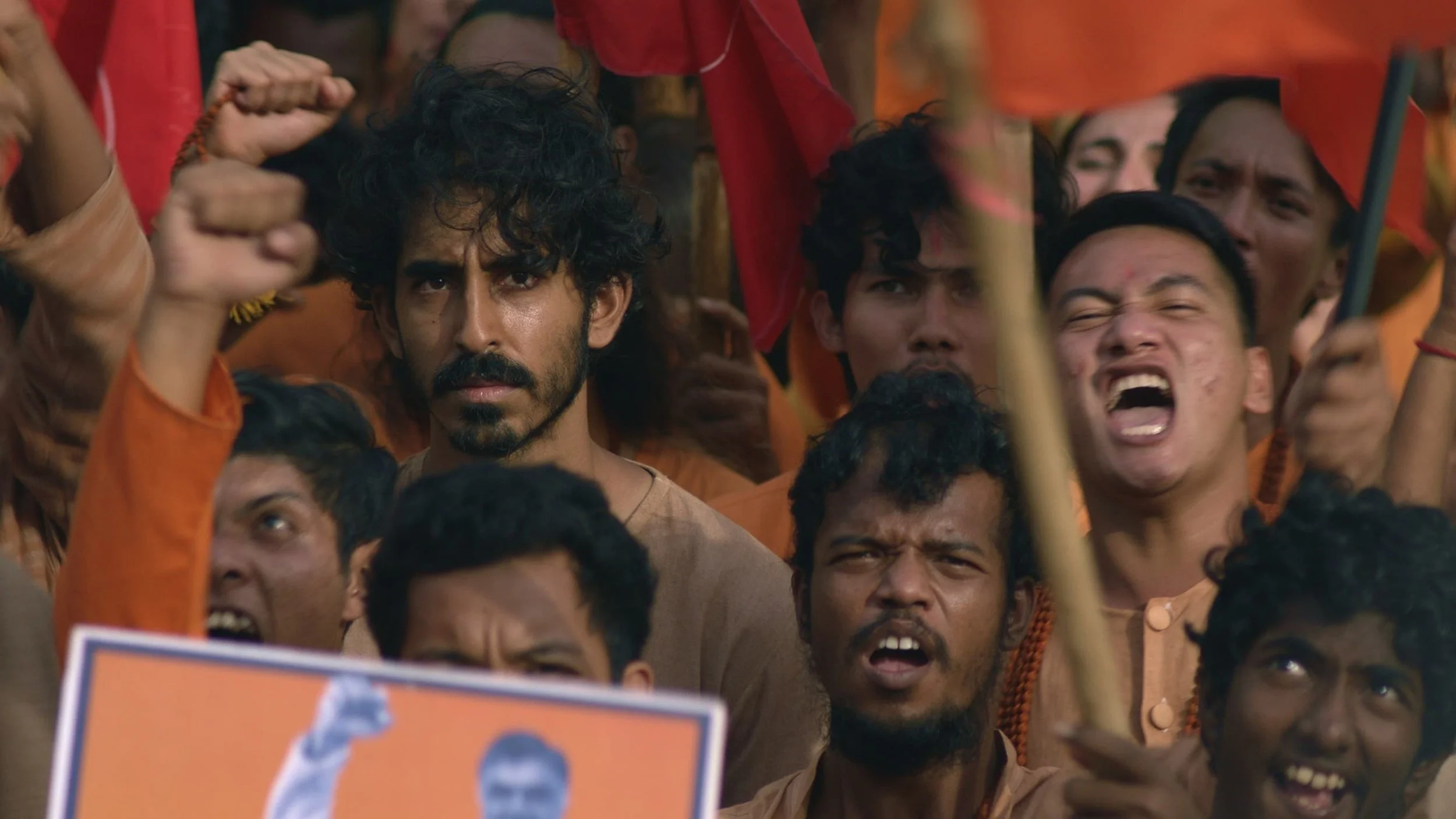Dev Patel's Directorial Debut Holds Nothing Back In Monkey Man
Monkey Man is an action movie junkie's newest drug. It's fast-paced, hyper-violent, and very bloody. Dev Patel set a high bar with his directorial debut. He is showing us exactly who he is as a filmmaker, and it's a thrilling way to get the audience excited for future work. What will the sophomore film look like if this is what he does for his first movie?
The film jumps straight into the heart of Kid's world, giving us a glimpse into the warmth of his childhood, before quickly moings to present day. There's no background story or knowledge of his identity. We are entirely in the dark. Kid works at an Indian fight club where he gets paid to put on a show for the crowd and take punches. His boss Tiger (Sharlto Copley) is an energetic jackass with too much money and not enough sense, who underpays if you don't get what he calls "the bleed bonus." And though, for the beginning of the movie, you consider that Kid might just be a man looking for work who gets caught up it the wrong crowd, nothing is that direct in this movie expect for the punches. There's something much bigger at play here. Traumatized by witnessing his mother's murder, Kid carries this pain both literally and metaphorically. He seeks vengeance, dedicating himself to making those responsible for his mother's death pay. However, his adversaries are no ordinary foes. They are considered royalty to this land in guru Baba Shakti (Makarand Deshpande) and corrupt police chief Rana (Sikander Kher). Kid must navigate the dangerous underworld to reach them.
Kid is on a mission trying to get himself into the underground world, but nothing is done right without a little bit of help. His plan begins to unfold when a thief in a wheelchair creates a distraction to lift a wallet off a woman at an outdoor café. The wallet swiftly moves throughout the streets, passing from one person to the next until it finally reaches Kid's hands. The scene is a perfect sequence of events that foreshadow the lens of the rest of the movie. Not long after, Kid finds himself in the heart of the beast surrounded by girls, cocaine, drinks, and seductive lighting. I believe it is what the filmmakers call “a den of iniquity.”
It takes a minute to figure out why Kid is so anxiously watching these men, analyzing their moves, having emotional outburst, and making friends with a stray dog. But, when he goes to buy a gun, it becomes clear that this isn't just a scare tactic. He intends to lay his demons to rest and he's not going about it quietly. And that doesn't go all too well for him, but were we expecting anything else?
He finds himself on the run, in pain, and left for dead, but he is taken in by a community of trans women who have been exiled and forgotten. It is there that he finds himself, becomes one with his pain, and turns it into something to channel. It's the community leader Alpha (Vipin Sharma) who makes him come face to face with his purpose.
Patel clearly demonstrates his ability to craft an epic action film. He excels as Kid, an intense, determined loner with a heart of gold yet burdened with profound pain. The standout feature of this film is the fast-paced fighting sequences that steal the show. Surprisingly, these battles represent the most emotional component of the narrative, offering a sense of completeness. A large part of that was because of the stellar camera work. The film was shot in such a raw and personal way that it made the audience feel immersed into the bloodshed and chaos. There was so much destruction that it never gave you a second to breathe. The work of cinematographer Sharone Meir is clear but unsteady, reckless, and all in your face in the most perfect way. Everything feels alive, like you're in the middle of all the chaos, and the adventure is yours. It doesn't make you sit on the edge of your seat. Instead, it pulls you back and makes you settle in. It is intimate and that's where Patel sets himself apart. Yes, he pays tribute to this genre with a rich history, but he doesn't just emulate. He redirects and reimagines and you can see his vision and passion.
However, the film's narrative structure reveals Patel's areas for improvement. This movie is fast-paced and intense and, though that keeps the film going, it's also where it falls apart. There are so many components being captured between the Indian mythology and Kid's backstory. Too much is happening, often leaving the audience clueless during the initial stages of the narrative. Who's Kid? What's his vendetta really about? And yes, it all beautifully comes together when Kid reaches the temple where all the pieces start to fall, but it makes the storytelling feel like an afterthought. The emotion Patel tries to evoke from the audience with the unraveling of his trauma doesn’t quite hit as intended, leaving us to rely on other scenes to connect with Kid. A standout scene is the training sequence accompanied by drums. It's a captivating interplay between the drums and Kid, with women cheering at his power. It's one of the few scenes that isn’t fast-paced or overly bloody, allowing us to see Kid in his element, but yet again he’s throwing fists.
Patel's ambition is evident, which is shown by his desire to capture multiple narratives. And though he could have done with more clarity, he does pull off a new take on revenge films. Patel isn't just capturing a revenge story or epic fight scenes. He's also capturing culture and commenting on society in a big way. There is a balance of celebrating culture but also pushing people to ask questions that we are often scared to. This world he created may be fictional, but the problems within it aren't. They are part of our world today. Monkey Man comments on it in a very unforgiving and invasive manner. Where there is loss, there's a community, and where there is a community, there's loss, and Patel asks us to think about this. Alpha says, "Close your eyes, and you will find yourself… look beneath the surface." This story focuses on power and liberation just as much as it focuses on throwing a great punch.
There is no singular focus here. It's not just a movie filled with dismembered body parts and cars named after rap stars. The problem and yet the essence of this film lies in its extensive theme layering. But what truly brings it all together? The fighting. The fight scenes are what sell the film, adeptly weaving together all the fragmented elements into a coherent narrative.
Monkey Man is in theaters now.






